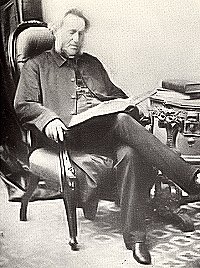Introduction

Born: December 31, 1799, London, England.
Died: December 26, 1874, Rugby, England, of smallpox he caught from a parishioner.
Buried: St. Andrew’s Church, Rugby, England.

Born: December 31, 1799, London, England.
Died: December 26, 1874, Rugby, England, of smallpox he caught from a parishioner.
Buried: St. Andrew’s Church, Rugby, England.
John was the husband of Harriet Margaret Ferguson, and father of hymnists Gerard and Mary Dunlop Moultrie.
He was educated at Trinity College, Cambridge (BA 1823), where he was Bell’s University Scholar in 1822.
Taking Holy Orders in 1825, he was presented that year by the Earl of Craven to the rectory of Rugby, where he served the rest of his life (part of the Rugby Parish Church is still known as the Moultrie Aisle
).
Art thou content to be the modern Tyre—
Half pedlar and half pirate of the world?
To count the sails of merchant navies furl’d
In thy full ports? To know that some admire
And many fear, and almost all desire
To see thee from thy throne of empire hurl’d,
And o’er thy palace-halls the smoke-wreaths curl’d,
Which speak the presence of avenging fire?
Thine, England, is the sceptre of the sea,
That thou mayst bear God’s message thro’ the earth,
And spread the truth which makes man’s spirit free,
Kindling on many a bright colonial hearth
A flame from that pure altar, rear’d for thee
Long since—an heir-loom of uncounted worth.
But hast thou to thy destiny been true,
And bravely play’d the part to thee assign’d,
Dispensing to the tribes of human-kind
Of heavenly truth the fertilizing dew,
And labouring hard the heathen and the Jew
In one great bond of Christian love to bind?
What are thy boons to man’s benighted mind?
How much, for service done him, is thy due?
From thine imperial throne, proud Queen, look forth,
Survey thy boundless empire, and declare
In farthest East and West, and South and North,
What trace is found of thy maternal care?
What generous zeal, that subject lands may share
The Gospel-pearl’s inestimable worth?
Mistress thou art of matter—not of mind;
The elements obey thee—on the foam
Of the sea-waves thou dwell’st as in an home;
Canst bind and loose the pinions of the wind—
Control the lightning—pathways force or find
Through earth’s dark entrails, where thou will’st to roam;
And like a restless and resistless gnome,
The granite mountains into powder grind.
’Tis thus the heathen know thee; thus behold,
With shuddering awe, the paths thy steps have trod,
As of a demon who hath power to mould
Earth to his will; and while they fear thy rod,
Deem thy sons curst—predestined from of old
To vengeance, as a race without a God.
Can a clean thing come out of an unclean,
Life-giving waters from a tainted spring?
Can sensual hearts the songs of Zion sing,
High faith be born of abject thoughts and mean?
The Gospel-torch, if lit at hearths obscene,
O’er new-found worlds celestial radiance fling?
Can fiend-like hate speed angels on the wing,
And Hell’s worst discord breed Heaven’s peace serene?
O England, wouldst thou do thine office well,
Evangelizing earth’s remotest ends,
First cleanse the homes in which thy children dwell
From social wrong, which God and man offends;
From fraud that robs, from factions that rebel,
From greed and avarice, making foes of friends.
A stately ship is scudding o’er the main,
Her sails full set, with favouring wind and tide;
To speed like hers the ocean seems not wide;
Her masts beneath their canvass bend and strain,
Proudly her keel ploughs through the watery plain;
But evil faces scowl across her side—
Grim felon aspects, fierce and murderous-eyed—
Rogues, whom their country will no more retain.
So forth they fare, by her august commands
To people a new empire, to become
Progenitors of rogues in other lands,
To make a hell of their appointed home;
To spread with pregnant hearts and dexterous hands
Crime and pollution, wheresoe’er they roam.
Prolong the scene—a statelier vessel sails
In the same track, and bears a worthier freight;
Propitious omens on her voyage wait!
Smooth be the waves, and prosperous the gales
From which the settlers in Australian vales
Expect the fathers of their Church and State—
The men whose deeds, Heaven grant, not yet too late,
Shall live hereafter in heroic tales.
Speed, modern Argo, speed upon thy track,
Those who shall feed the flock—not shear the fleece;
From error’s path bring many a wanderer back;
From sin’s strong bonds imprison’d souls release,
And win a world, which else had gone to wrack,
To the mild empire of the Prince of Peace.
Who are the Heroes of the latter day?
The lords of earth—the champions of mankind?
Think not, O Christian, those great hearts to find
Amidst the carnage of the battle fray,
Nor where fierce conquerors gory sceptres sway,
And on men’s necks oppressive burdens bind,
Well-pleased the faces of their race to grind,
And see obsequious multitudes obey.
But seek them in the vast colonial wild—
The mitre, not the helmet, on their brow—
Wrestling with wrong, in love and patience mild—
Through good and ill still faithful to their vow—
Training the savage, like a docile child,
Before their Lord’s victorious cross to bow.
John Moultrie
Altars, Hearths, and Graves, 1854